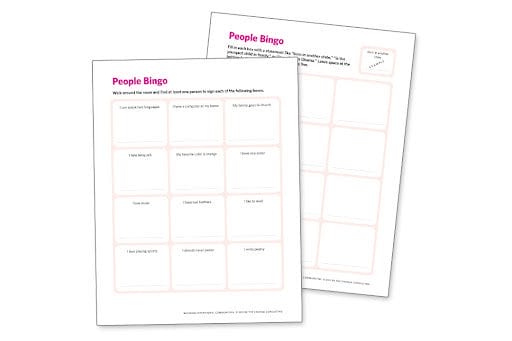Bingo is one of the most popular games in the world. And contrary to popular belief, people of all ages are enthusiastic about it.
Bingo is a social game that fosters camaraderie and friendship among players. It’s also an inclusive activity that people from all identities can enjoy.
Bingo’s popularity and accessibility are part of the inspiration for our People Bingo activity. We’ve designed it so that your students can get to know their classmates, one interesting trait at a time.
People Bingo’s prize is student relationship building
People Bingo isn’t about numbers, chips, or money. Our version of bingo is centered on connecting students with their peers and building community, so there are no losers.
People Bingo substitutes numbers for student facts and statements. In this student relationship building activity, participants move around the room interviewing classmates. The first person who can find someone to sign their name to every statement on the grid wins!
These easy, quick interactions between students that involve them asking one another questions like “do you speak two languages?” or “do you write poetry?” may seem small, but they’re actually a huge accomplishment for introverted kids who have to work up the courage to interact with others. These interactions are just long enough for them to engage with their peers, but not so long that they cause them anxiety.
As educators, our job is to orchestrate experiences that will allow young people to build relationships with one another. People Bingo and other BTC icebreakers nudge these relationships along in a structured way.
Student relationship building tools like our People Bingo icebreaker are rooted in a group-development theory that recognizes that students form relationships at their own pace. Using a river as a metaphor for new experiences, we can compare this development to a group of kids approaching a raft to take a ride down a river. Some will plunge into the water head first, busting at the seams to swim and ready to make friends immediately. Others will dip their toe into the water but are hesitant to submerge themselves because they need to develop trust between their teachers and their peers first, and some have a painfully difficult time connecting and building relationships.
Student relationship building tools flatten social hierarchies and build social equities
Creating spaces where students can find and expand upon their similarities helps them to build social resource, which can go a long way to foster inclusion, humanize students among their peers, and promote positive interactions between children.
For example, if an outgoing popular kid and a shy kid with less social resource discover that they both like going to the beach, this commonality can go a long way in the eyes of the other students. Suddenly, the shy, unpopular kid has something they can gab about with one of the popular kids. Over time, these activities humanize every child, which makes a real difference in how they interact with one another.
This student relationship building activity is one of 45 in a curriculum that uses experimental activities to develop critical thinking skills in children. These icebreakers and games are great to kickstart the school year or to weave into weekly lessons that encourage students to reject the rigid, social hierarchies that rank them based on popularity, race, gender, and class, in favor of social equality for all kids.

People Bingo creates a safe space for students at all levels of relationship development to get to know one another better.
All forms of bingo can build camaraderie among participants, but bingo that centers people and rewards players with the prize of developing meaningful connections is the most rewarding one of all.
Ready to try out this student relationship building activity? Download our free handout and play today!

Love this activity and want more? Visit Experiential Activities to Develop Critical Thinkers.









